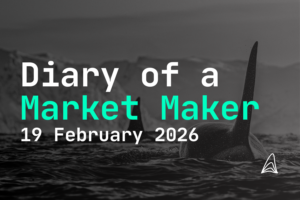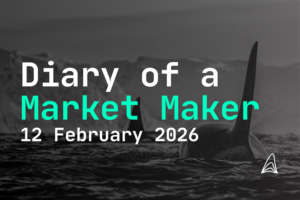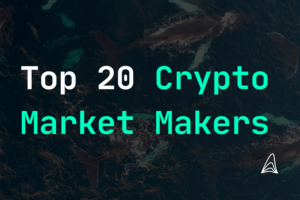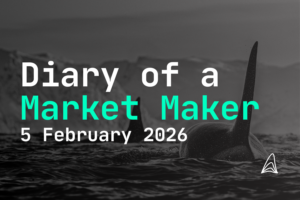Market making ensures price stability by reducing volatility through liquidity provision, spread management, and arbitrage. These strategies create a balanced trading environment, minimizing sudden price swings and aligning prices across exchanges.
- Jakob Brezigar
- Last updated: 14. November 2024
- Reading time: 4 min
The Impact of Market Making on Token Price Stability
Market making is crucial in cryptocurrency markets, stabilizing token prices, reducing volatility, and enhancing liquidity. Through strategies like arbitrage, spread management, and liquidity provision, market makers create efficient trading environments and support fair price discovery.

Table of Contents
What is market making in cryptocurrency?
Market making involves placing buy and sell orders to provide liquidity, stabilize token prices, and ensure smooth trading. It reduces bid-ask spreads, enhances trading efficiency, and supports price stability in volatile cryptocurrency markets.
Why is token price stability important?
Token price stability builds investor confidence, supports real-world use in DeFi and payments, and ensures smoother trading. It helps projects plan resources effectively and fosters long-term success.
Key Takeaways - The Impact of Market Making on Token Price Stability:
- Market making ensures token price stability by reducing volatility, narrowing bid-ask spreads, and enhancing liquidity in cryptocurrency markets.
- Key strategies include arbitrage, spread management, and dynamic liquidity provision to stabilize prices and support efficient trading environments.
- Market making is vital for newly launched tokens, improving price discovery, trading volume, and market credibility.
- Challenges like volatility, regulatory complexities, and operational risks require advanced systems and adaptive strategies to maintain stable markets.
- As crypto evolves, market making remains essential, driven by DeFi integration, technological innovation, and the need for sustainable market growth.
Overview of Market Making in Cryptocurrency
Market making is vital in cryptocurrency markets, stabilizing prices, reducing volatility, and improving liquidity. It builds trust, supports smaller exchanges and new tokens, and enhances price discovery, driving broader adoption and long-term crypto project success.

Importance of Price Stability for Tokens
Token price stability is a cornerstone of a successful cryptocurrency project. Volatile price swings can deter potential investors, create mistrust among existing holders, and hinder the token’s adoption in real-world applications.
Price stability ensures that tokens can be effectively used in decentralized finance (DeFi) platforms, payment systems, and other blockchain-based applications. Moreover, a stable price allows projects to predict and plan their financial needs better, enabling them to allocate resources effectively.
Market making becomes a critical tool in achieving this stability by mitigating price fluctuations and ensuring consistent liquidity.
Understanding Market Making
Definition and Role of Market Makers
Market makers ensure liquidity by placing competitive buy and sell orders, reducing price gaps and volatility. In cryptocurrency markets, they address high volatility and limited oversight by adjusting orders to market conditions, enabling efficient trades, narrowing bid-ask spreads, and boosting volumes to maintain market quality.
How Market Makers Operate in Crypto Markets
Cryptocurrency market makers use advanced algorithms to ensure liquidity and price stability by placing orders across exchanges and adjusting to real-time market changes. They perform arbitrage to align prices and work with token issuers to customize strategies, including liquidity management and token launch support.
The Relationship Between Market Making and Price Stability
Market makers use several mechanisms to ensure token price stability. By placing buy and sell orders within a narrow range, they create a buffer against sudden price swings, reducing volatility through spread management. Liquidity provision is another key strategy, injecting capital to maintain trading activity and prevent significant price changes caused by low liquidity. Additionally, market makers monitor order books and trading patterns to detect and counter market manipulation.
Factors Influencing Price Stability in Market Making
Several factors play a critical role in how market making contributes to price stability.

Liquidity
One of the primary elements is liquidity, as higher liquidity reduces the likelihood of large price swings. Market makers provide this liquidity by consistently placing buy and sell orders, ensuring that tokens can be traded efficiently without causing drastic price changes.
Order Book Depth
Another key factor is order book depth, which market makers enhance by maintaining orders at various price levels. This minimizes the impact of large trades and prevents significant price fluctuations. Additionally, they monitor trading activity to detect and counter market manipulation, safeguarding price stability.
External market conditions
Lastly, external market conditions, such as overall trading volume and market sentiment, also affect price stability. By employing advanced strategies and leveraging real-time data, market makers adapt to these external conditions to maintain a stable trading environment.
Strategies Employed by Market Makers
Automated Market Making (AMM)
Automated Market Making (AMM) leverages smart contracts and liquidity pools to facilitate trading without the need for a traditional order book. Instead of matching buyers and sellers directly, users contribute funds to liquidity pools, enabling seamless trades. Market makers in AMM systems provide liquidity to these pools, earning fees in return. This approach ensures continuous trading activity and helps stabilize token prices by maintaining balanced liquidity.
Order Flow Analysis
Order flow analysis is a strategy where market makers monitor the flow of buy and sell orders to predict future market movements. By studying order size, frequency, and bid-ask dynamics, they can adjust their bids and ask prices, positioning themselves to profit from anticipated price swings. Large orders at key levels indicate strong buying or selling pressure, guiding market makers to adjust their strategies and capitalize on price changes. This proactive approach allows market makers to act on shifts in market sentiment and create profitable opportunities.
Arbitrage and Spread Management
Arbitrage is a key strategy for market makers, aligning token prices and reducing volatility by exploiting price discrepancies across exchanges, ensuring price consistency across all trading platforms.
Spread management is crucial for maintaining token price stability. By narrowing the bid-ask spread, market makers boost trading volumes and lower transaction costs for traders, fostering a stable and efficient trading environment.
Liquidity Provision Techniques
Liquidity provision is central to market-making, as market makers inject capital and place buy and sell orders at various price levels to ensure sufficient liquidity for seamless trading. Advanced techniques, such as dynamic order adjustments and volume-weighted pricing models, allow market makers to adapt quickly to market changes, maintaining continuous liquidity and price stability.
Quoting and Spreading
Quoting and spreading are fundamental strategies in market making, where market makers continuously provide bid (buy) and ask (sell) prices to ensure liquidity and efficient trading. The bid-ask spread, the difference between these prices, compensates market makers for the risks they assume, such as price fluctuations. By maintaining competitive spreads, market makers reduce transaction costs, stabilize token prices, and enhance overall market efficiency, particularly in volatile cryptocurrency markets.
Inventory Management
Inventory management is a crucial strategy in market making, focusing on maintaining a balanced portfolio to mitigate risks associated with holding large positions. Market makers continuously adjust their buy and sell orders to prevent excessive accumulation of assets or liabilities, which could lead to significant losses if market prices move unfavorably. Effective inventory management involves setting inventory thresholds and dynamically adjusting quotes to encourage trades that bring inventory back to desired levels. Advanced techniques, such as deep reinforcement learning, have been explored to optimize these strategies, enabling market makers to adapt to changing market conditions and maintain liquidity while controlling risk.
Challenges Faced by Market Makers
Volatility in Cryptocurrency Markets
Cryptocurrency markets are known for their high volatility, with token prices often experiencing rapid and unpredictable changes. This volatility presents challenges for market makers, who must consistently provide liquidity while managing the risks of sudden price swings. To address this, strategies such as real-time monitoring and advanced algorithms are crucial for ensuring token price stability and reducing market manipulation risks.
Regulatory and Compliance Issues
The rapidly evolving regulatory landscape in cryptocurrency markets presents significant challenges for market makers. They must navigate differing laws and compliance requirements across jurisdictions, particularly in the European Union, where stricter regulations apply. Orcabay’s fully regulated and transparent approach ensures compliance with EU laws, offering clients peace of mind while maintaining token price stability and liquidity.
Technological and Operational Risks
Market makers rely heavily on sophisticated technology and automated systems, which can occasionally face operational risks such as system failures or latency issues. Ensuring seamless order execution and market monitoring requires robust infrastructure and adaptive strategies. Orcabay ensures operational reliability and protection against external threats, such as bot attacks or market manipulation.

Benefits of Market Making for Token Projects
Enhanced Liquidity and Trading Volume
Market making significantly enhances liquidity and trading volume, ensuring tokens can be traded seamlessly on exchanges. High liquidity not only attracts more traders but also minimizes price slippage, creating a more stable trading environment.
Improved Investor Confidence
Token price stability, facilitated by market makers, is crucial for building investor confidence. Stable prices reduce the risk of sudden losses, encouraging both retail and institutional investors to engage with the token. Orcabay’s transparent reporting and live dashboards provide token issuers with a clear view of market strategies, reinforcing trust among stakeholders.
Facilitation of Fair Price Discovery
Market makers play an essential role in ensuring fair price discovery by aligning token prices across exchanges and narrowing bid-ask spreads. This creates a more transparent market environment, benefiting both traders and issuers. Orcabay excels in this area by using advanced algorithms to maintain price consistency and reduce volatility, ensuring fair market conditions for all participants.
Higher Likeliness of Getting Listed on Tier 1 Exchanges
A key benefit of market making for token projects is the higher likelihood of getting listed on Tier 1 exchanges. Top exchanges prioritize tokens with strong liquidity and stable trading volumes. Market makers ensure this by providing continuous buy and sell orders, creating a stable market environment. This improves a token’s credibility and attractiveness to exchanges, increasing its chances of being listed on major platforms.
Market Making in Token Launches
Market making is essential during ICOs and TGEs, helping manage liquidity and stabilize token prices to reduce volatility and gain market traction. By maintaining a balanced order book and deploying tailored strategies, market makers address liquidity, volatility, and price discovery. Orcabay’s adaptive approach ensures successful market entry by maintaining consistent liquidity and preventing extreme price fluctuations.
During a Token Generation Event (TGE), projects often face high sell pressure, which can lead to sharp price declines. A reliable market maker like Orcabay is crucial in absorbing this pressure, stabilizing prices, and ensuring a sustainable market presence. By providing liquidity and managing the order book, Orcabay helps maintain market stability, promoting long-term success for the project.
Future Trends in Market Making
Evolution with Decentralized Finance (DeFi)
The rise of DeFi is transforming the role of market making, with automated market makers (AMMs) and liquidity pools becoming more prominent. These innovations enable decentralized liquidity provision but require market makers to adapt their strategies for hybrid environments.
Impact of Regulatory Developments
As global regulations surrounding cryptocurrencies tighten, market makers must stay ahead of compliance requirements to remain effective. Transparent operations and adherence to regulatory standards will become increasingly important. Orcabay’s proactive approach to regulatory compliance ensures that its clients can navigate these changes without compromising liquidity or token price stability.
Technological Innovations in Market Making
Advancements in technology, such as machine learning and blockchain analytics, are driving the future of market making. These tools enable more accurate predictions of market movements and more efficient liquidity management.

Concluding Thought on The Impact of Market Making on Token Price Stability
Market making is a cornerstone of cryptocurrency markets, playing a critical role in stabilizing token prices, enhancing liquidity, and supporting efficient trading. By employing strategies such as arbitrage, spread management, and liquidity provision, market makers reduce volatility and facilitate fair price discovery, benefiting both traders and token issuers. Despite challenges like market volatility, regulatory complexities, and operational risks, market making continues to drive the growth and credibility of the crypto ecosystem. As the industry evolves with DeFi and new technologies, market making will remain essential for fostering broader adoption and sustainable success.
Disclaimer: The information provided in this article is for informational purposes only and does not constitute financial, investment, or other professional advice. All opinions expressed herein are solely those of the author and do not represent the views or opinions of any entity with which the author may be associated. Investing in financial markets involves risk, including the potential loss of principal. Readers should perform their own research and consult with a licensed financial advisor before making any investment decisions. Past performance is not indicative of future results.

Jakob Brezigar
Jakob, an experienced specialist in the field of cryptocurrency market making, boasts an extensive international presence. With Orcabay, he has skillfully managed major operations and deals for a wide array of global stakeholders.




